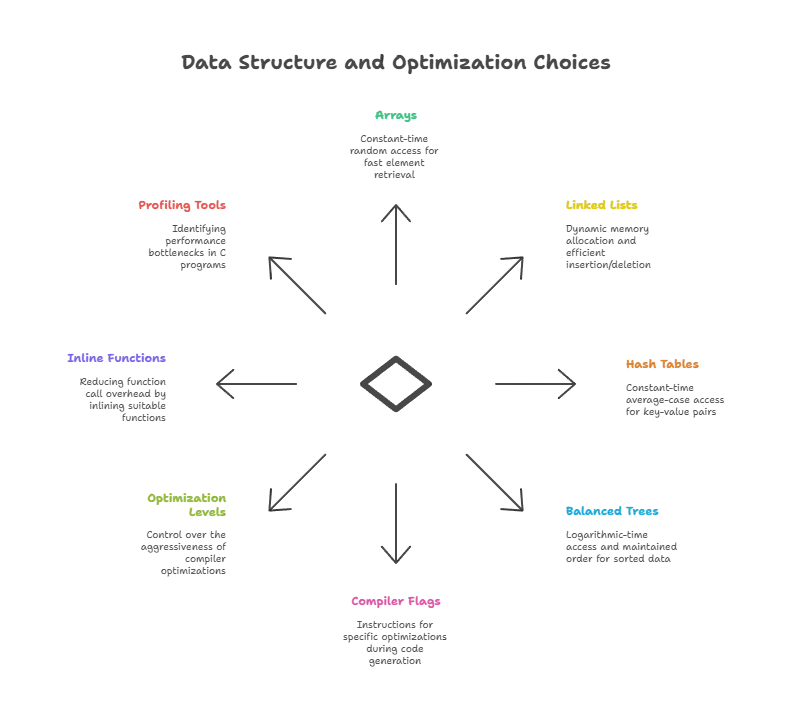Optimization Techniques and Performance Tuning
In this chapter, we'll delve into optimization techniques and performance tuning in the C programming language. Optimization is a critical aspect of software development, aiming to enhance program efficiency, reduce resource consumption, and improve overall performance. We'll start with the basics and gradually progress to more advanced techniques, covering various aspects of C programming.
Understanding Performance Optimization
Performance optimization involves improving the speed and efficiency of a program. This can be achieved by reducing execution time, minimizing memory usage, and optimizing algorithms. Let’s explore some fundamental optimization techniques:
Optimizing algorithms involves selecting the most efficient approach to solve a problem. This often entails analyzing the time complexity of different algorithms and choosing the one with the best performance characteristics. For example, consider the following code to calculate the factorial of a number
#include <stdio.h>
int factorial(int n) {
if (n == 0 || n == 1)
return 1;
else
return n * factorial(n - 1);
}
int main() {
int num = 5;
printf("Factorial of %d is %d\n", num, factorial(num));
return 0;
}
// output //
Factorial of 5 is 120
In this code, the factorial function uses recursion to calculate the factorial of a number. While this approach is simple, it may not be the most efficient for large inputs due to the overhead of function calls. An iterative solution may offer better performance.
Compiler Optimization
Modern compilers employ various optimization techniques to improve the performance of generated code. These optimizations can include loop unrolling, inline expansion, and dead code elimination. Let’s consider an example
#include <stdio.h>
int main() {
int sum = 0;
for (int i = 1; i <= 1000; ++i) {
sum += i;
}
printf("Sum: %d\n", sum);
return 0;
}
// output //
Sum: 500500
Here, the compiler may optimize the loop by unrolling it or using SIMD instructions for parallel execution, leading to faster computation.
Memory Optimization
Efficient memory usage is crucial for performance optimization. This involves minimizing memory allocations, reducing memory fragmentation, and utilizing data structures effectively. Consider the following example
#include <stdio.h>
#include <stdlib.h>
int main() {
int *arr = (int *)malloc(100 * sizeof(int));
if (arr == NULL) {
printf("Memory allocation failed\n");
return 1;
}
// Use the allocated memory
free(arr); // Free allocated memory
return 0;
}
Here, we allocate memory dynamically for an array of integers. It’s essential to free the allocated memory using the free function to prevent memory leaks.
Loop Optimization
Loops are frequently encountered in C programs, and optimizing them can yield significant performance improvements. Here are some techniques for optimizing loops:
Loop Unrolling
Loop unrolling involves reducing loop overhead by executing multiple loop iterations within a single iteration. This can improve performance by reducing branching and instruction overhead. Let’s consider an example
#include <stdio.h>
int main() {
int sum = 0;
for (int i = 0; i < 10; ++i) {
sum += i;
}
printf("Sum: %d\n", sum);
return 0;
}
// output //
Sum: 45
In this loop, the compiler may unroll it to eliminate loop overhead, resulting in faster execution.
Loop Fusion
Loop fusion involves combining multiple loops that operate on the same data into a single loop. This reduces memory access overhead and improves cache locality. Consider the following example
#include <stdio.h>
int main() {
int arr1[100], arr2[100], result[100];
// Initialize arrays arr1 and arr2
for (int i = 0; i < 100; ++i) {
result[i] = arr1[i] + arr2[i];
}
// Use the result array
return 0;
}
Here, combining the initialization and computation loops into a single loop can improve performance by reducing memory accesses.
Data Structure Selection
Arrays vs. Linked Lists
Arrays offer constant-time random access, making them suitable for scenarios where fast access to elements by index is required. On the other hand, linked lists excel in dynamic memory allocation and insertion/deletion operations.
Hash Tables vs. Balanced Trees
Hash tables provide constant-time average-case access for key-value pairs but may suffer from collisions. Balanced trees, such as red-black trees, offer logarithmic-time access and maintain order, making them suitable for sorted data.
Compiler Flags
Compiler flags play a vital role in optimization by instructing the compiler to apply specific optimizations during code generation. Here are some common compiler flags:
Optimization Levels
Compiler optimization levels, such as -O1, -O2, and -O3, control the aggressiveness of optimization. Higher optimization levels may increase compilation time but can significantly improve runtime performance.
Inline Functions
The -finline-functions flag instructs the compiler to inline suitable functions, reducing function call overhead.
Profiling Tools
Profiling tools help identify performance bottlenecks in C programs by analyzing their runtime behavior. Here are some popular profiling tools:
gprof
gprof is a profiling tool available in the GNU Compiler Collection (GCC). It generates a profile of the program’s execution, including function call graphs and execution times.
Valgrind
Valgrind is a suite of tools for debugging and profiling. Its cachegrind tool provides cache simulation and helps identify cache-related performance issues.

Optimization techniques and performance tuning are essential aspects of C programming, aiming to improve program efficiency and reduce resource consumption. By understanding and applying various optimization techniques, programmers can develop faster and more efficient software. Experimentation, profiling, and continuous refinement are key to achieving optimal performance in C programs. Happy coding!❤️
